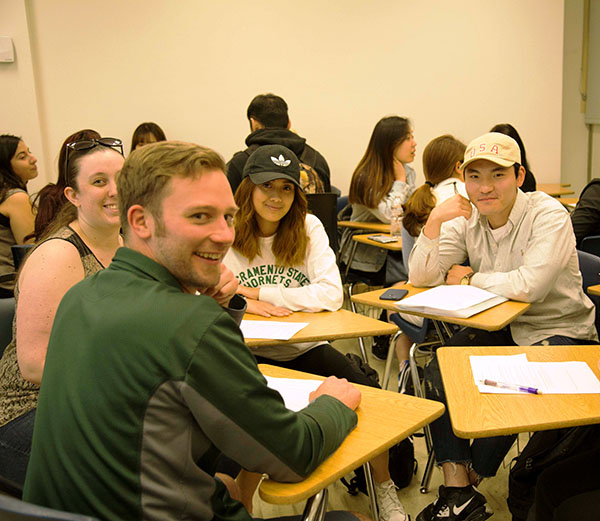 During weekly Conversation Clubs, Sacramento State and English Language Institute students meet and discuss topics such as food and holidays, to help ELI students hone their English speaking skills. (Sacramento State/Jessica Jarrety)
During weekly Conversation Clubs, Sacramento State and English Language Institute students meet and discuss topics such as food and holidays, to help ELI students hone their English speaking skills. (Sacramento State/Jessica Jarrety)It’s a little before lunchtime, and in a Del Norte Hall classroom, a small group of international students has burgers on the brain.
“What’s your favorite hamburger place?” asks Alessandra McMorris, senior academic specialist with Sacramento State’s English Language Institute (ELI). The usual suspects are mentioned: In-N-Out, Five Guys, The Habit. Or, perhaps, all of the above.
“I don’t care about the restaurant,” replies Alex Lee, an ELI student from South Korea. “I just like hamburgers.”
It may not sound like the most in-depth conversation, but what is taking place is profound. In these weekly Conversation Clubs, ELI students and volunteers from Sacramento State – often students from the Teaching English to Speakers of Other Languages (TESOL) or Communication Sciences and Disorders programs – gather to discuss casual, informal topics such as food or holidays. The goal is to help the international students hone their English skills and become more confident speaking the language. But perhaps even more importantly, the meet-ups help them build connections and friendships that can ease the isolation that often comes from studying in a foreign country.
“I was an international student myself, and I know how hard it is to just go out and talk to people,” says McMorris, who is originally from Brazil. “This is a friendly atmosphere and environment for our students to improve their listening and speaking skills. They also learn more about Sac State, and some of them make lifelong friends.”
The English Language Institute, run through Sacramento State’s College of Continuing Education, offers several programs throughout the year to help international students become stronger English speakers and learn about American culture to prepare them for study at a four-year college or university in the United States – often Sacramento State.
Conversation Clubs, which generally are optional but are often well-attended, provide ELI students an opportunity to hone their English skills in a less formal environment while gaining what Simon Hyatt, a recent Sacramento State graduate who has been leading the clubs over the summer, refers to as language acquisition.
“You can go into class and have a grammar lesson, and that’s learning,” Hyatt says, “whereas acquisition is actually hearing the way someone speaks, naturally picking up the sounds of a language, or essentially the accent.”
Hyatt typically starts each session by introducing the topic and providing a bit of relevant cultural knowledge. The hamburger discussion was a continuation of Hyatt’s “food week” presentation, which touched on the secret menu at In-N-Out Burger, as well as the fact that Sacramento is America’s “Farm-to-Fork” capital. He often includes local recommendations, such as Sacramento restaurants to check out or a list of local farmers markets.
Ian Chen, an ELI student from China, says his instructor required them to attend Conversation Club three times, but he continued to come after fulfilling that requirement because the meet-ups were a great way for him to practice his English with native speakers. In particular, he adds, it has been helpful to learn slang and other informal pieces of the language that may not necessarily be taught in a classroom.
“When I first heard the word ‘workout,’ I (didn’t) know what it means,” says Chen. “So after I talked to native speakers, they say they go to work out, and it means they go to the gym. The first time I heard that, it sounded like the need to go to work or something.”
In a similar fashion, Sacramento State student Bethany Rader spent a few minutes before the start of Conversation Club explaining to a small group that Americans often use the phrase “I’m sorry” in place of “no” when they are trying to be polite – “I’m sorry, I’m busy next Friday and won’t be able to make it,” for example. It’s among the idioms that come naturally to native speakers but are less obvious to learners, key pieces in helping them become comfortable speaking the language conversationally.
Rader, who is majoring in environmental studies and economics, began volunteering with Conversation Club in June as a way to expose herself to international cultures and perspectives. But she says some of her favorite moments of the past few weeks have come outside of the classroom, such as the day she was eating lunch at the University Union and recognized one of her new friends from ELI.
“I saw him walking and I yelled after him,” she says. “He came and sat with me and said, ‘You know, nobody’s ever hollered my name on campus.’ He said it made him feel like, ‘OK, I actually belong here now.’ ”
For Rader, who hopes to get involved in sustainability issues after she graduates, these cross-cultural connections are important to develop, because they may hold the key to solving some of the world’s most pressing challenges.
“These students are very driven, and they want very much to succeed and to be able to stay here, and ultimately what I’ve learned from them is that everybody’s just doing the best they can with what they’ve got,” she says. “Even if their perspectives are different from mine, everybody at the end of the day wants to make a better life for themselves and their family, and I think realizing that can help us to bridge gaps we have in understanding other people.” – Jonathan Morales
Published: August 3, 2017
